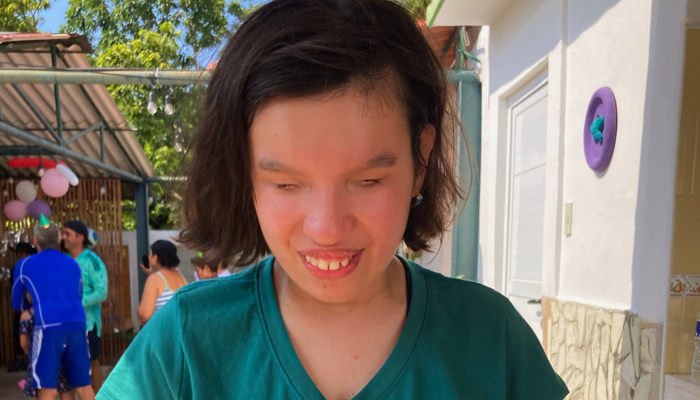Ask the TVI about Anophthalmia and Microphthalmia, Part 2

By Lisa LaDue, TVI
Readers Questions answered by TVI Lisa LaDue
Q: My son with monocular vision will start Pre-K next year. Is it necessary for him to sit in the front row to get the best view of the front board? Thank you, Maureen R.
A: He will receive a functional vision assessment (FVA) before entering Pre-K (if he does not currently have one) which will be done by a Teacher for the Visually Impaired and Blind (TVI) and is required as part of his Individual Education Plan (IEP). The components of the functional vision assessment may include appearance of eyes, visual reflexes, visual responsiveness and perception, muscle balance, eye preference, oculomotor behaviors, field of vision, color vision, depth perception, figure-ground perception, light sensitivity and light-dark adaptation, contrast sensitivity, visual acuity, visual motor coordination, visual cognitive skills and visual perceptions skills. All this information will assist the IEP team in determining if he will need any accommodations, such as sitting in the front row of the classroom.
In addition, the TVI can observe him in the classroom at the beginning of the school year and note the approximate distances between his desk and the area where visual information is being presented and the distances from his desk to the area where the teacher typically provides instruction to the class.
Other important factors that should be considered include the reflection of the light sources on overheads, dry erase boards, chalkboards and other surfaces where he is expected to retrieve visual information. For example, he may need to be seated in the front row while the teacher is writing on the chalkboard so he can visually access the information. On the other hand, during circle time he may choose to sit anywhere he wants because the viewing distance is shortened so he can easily retrieve visual information.
It’s important to remember that it is not always the best practice to assume that because a child is visually impaired he or she needs to be seated in the front row. This can lead to negative beliefs that all individuals who are visually impaired need to be seated in the front of the room. For instance, an individual with retinitis pigmentosa which can cause a decrease in both the peripheral and central vision, also called “tunnel vision,” would probably see better by sitting in the back of a room. In addition, if children who are visually impaired are always expected to sit in the front row, as they transition into higher grades they may feel embarrassed or ashamed of their visual disability which can negatively impact social relationships and later lead to isolation.
Q: My daughter, Jadyn, is 7 months old and has monocular vision. I was advised to get her in early intervention services as well as Orientation and Mobility as early as possible. Her Early Intervention teacher comes to our house twice a month and so far Jadyn is developing just like any typical 7-month-old child: crawling, pulling herself up, etc. I asked about getting her O&M and was told that because she is sighted and is not going to be caning she doesn’t need services and therefore they won’t refer me to an O&M specialist. We live in a small town and contract an O&M specialist from a larger city. I have noticed that Jadyn is running into walls when she is crawling now. Do you think O&M is beneficial for my child who has monocular vision? Thank you, Jessica H.
A: Since I am not an O&M specialist, I consulted with one of my O&M colleagues. She suggested asking the case manager on Jadyn’s team to ask the O&M specialists to come and do an evaluation. Furthermore, a child’s vision can change over a short period of time therefore having Jadyn reevaluated by her primary eye care doctor may also be a good idea. Safety is very important and O&M specialists are trained to show parents and children how to use specific strategies to maintain safety while exploring their environment. Even if a child will not be using a cane, he or she may need to be taught sighted guide procedures, trailing techniques, self-protection techniques and basic cane skills. Learning theses skills will teach the child to travel safely, efficiently and gracefully through any environment and in a variety of environmental conditions. All in all, independent movement plays a significant role in Jayden’s overall growth and development.
Q: My son is 2 years old and totally blind from bilateral anophthalmia. When he was born we lived in a district where the TVI came to our house two times a week. Then we moved and in our new district the new TVI came only about once a month or even every other month. This TVI was shared with another school district. Finally, the school found a new TVI. She is also with another school district. We are supposed to see her once a week, but she hasn’t been in for the last 4 weeks.
At two years of age what are your thoughts on how often a TVI should work with a child? My son gets PT and OT twice a week (once during structured play group and another at home). I know he is getting enough PT & OT, but I am afraid about the lack of TVI services. I am a little afraid for the present, but more for the future and the actual learning of Braille, reading and other things. I know he will need more than twice a month, and I will insist on two to three times a week, but what should I do when they just don’t have a TVI available? Thank you, Janet G.
A: Part C of Individuals with Disabilities Education Act (IDEA), which became law in July 1998, specified that services must be delivered to infants with disabilities and those who are at risk for developmental delay from birth through 36 months. Under this law, eligible infants and their families are required to receive a multidisciplinary assessment and to have an Individualized Family Service Plan (IFSP) developed. If it is stated on your son’s IFSP that he is to receive vision services a certain number of minutes each week or each month then that is what he should be receiving.
In my county, which may be very similar to many other counties, if a child is not receiving the services that he or she is entitled to by law then first the case manager is notified. If that does not work, the IDEA representative is contacted. If that fails, then the parent can contact the county Exceptional Student Education (ESE) supervisor. If that does not work then contact the Department of Education Office of Special Education and Early Intervention Services in your state. The special education consultant will probably advise you to file a complaint. DO IT! I’ll bet that will get the ball rolling. If not, then you will be advised what the next step needs to be.
It is a good idea to go through the proper channels first to see if a problem can be solved at a lower level instead of going straight to the top. It is very important that all parents under the IDEA law are familiar with their rights and what to do if those rights are violated. The case manager can provide you with a list of resources from the very beginning when services first begin. Among the resources should be a list of agencies and organizations that can assist families with situations similar to yours.
One great resource is the National Association for Parents of Children with Visual Impairments (NAPVI) that supports state and local parents’ groups and workshops that educate and train parents about their children’s rights and more. By becoming familiar with IDEA, agencies and organizations that support children with visual disabilities and their families, you will know what to do and who to report to in any given situation.
If you have a question you’d like answered, please leave a comment below.
Related Posts

Eye Conditions and Syndromes, Support, Visual Impairment
Coping with a Diagnosis: Emotional Support for Families with Visually Impaired Children
Families with emotional support are more resilient. Learn how to establish emotional support with peers, professionals, and the community to help your family thrive.

Special Needs, Visual Impairment
Why Early Intervention Is Critical for Blind Children
Children diagnosed with visual processing disorders, low vision, or blindness need specialized treatment. Early intervention programs can help.

Eye Conditions and Syndromes
Finding Joy and Strength in Raising a Child with Anophthalmia
When raising a child with anophthalmia, be patient, be kind to yourself, and take it one day at a time. Your child will fill your life with love!